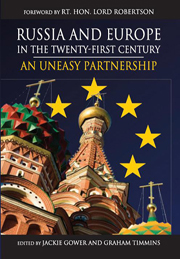Book contents
- Frontmatter
- Contents
- List of Contributors
- Acknowledgements
- List of Abbreviations/Acronyms
- Foreword Russia and Europe
- Preface
- Introduction Russia and Europe: What Kind of Partnership?
- PART 1 Russia looking West
- Chapter 1 Vladimir Putin and Russian Foreign Policy towards the West: Towards a New Realism
- Chapter 2 The ‘Normalization’ of Russian Politics and Europe
- Chapter 3 The Russian Elite Perspective on European Relations
- Chapter 4 Domestic Politics and Foreign Policy Formulation
- Chapter 5 Russia's Regions in Shaping National Foreign Policy
- Chapter 6 The Russian Military and European Security Cooperation
- PART 2 Europe looking East
- PART 3 Partnership in Practice
- Conclusion Russia and Europe: An Uneasy Partnership 289
- Index
- More Titles in this series
Chapter 1 - Vladimir Putin and Russian Foreign Policy towards the West: Towards a New Realism
from PART 1 - Russia looking West
Published online by Cambridge University Press: 05 March 2012
- Frontmatter
- Contents
- List of Contributors
- Acknowledgements
- List of Abbreviations/Acronyms
- Foreword Russia and Europe
- Preface
- Introduction Russia and Europe: What Kind of Partnership?
- PART 1 Russia looking West
- Chapter 1 Vladimir Putin and Russian Foreign Policy towards the West: Towards a New Realism
- Chapter 2 The ‘Normalization’ of Russian Politics and Europe
- Chapter 3 The Russian Elite Perspective on European Relations
- Chapter 4 Domestic Politics and Foreign Policy Formulation
- Chapter 5 Russia's Regions in Shaping National Foreign Policy
- Chapter 6 The Russian Military and European Security Cooperation
- PART 2 Europe looking East
- PART 3 Partnership in Practice
- Conclusion Russia and Europe: An Uneasy Partnership 289
- Index
- More Titles in this series
Summary
Introduction
‘The only realistic choice for Russia is the choice to be a strong country, strong and confident in its strength, strong not in spite of the world community, not against other strong states, but together with them.’
Putin, state-of the-federation speech, 8 July 2000President Vladimir Putin's overriding purpose from the very first days of his presidency from 2000 was the normalization of Russian foreign policy. Russia was to be treated as neither supplicant nor threat, but as just one more ‘normal’ great power. Through a combination of luck, skill and circumstances Putin achieved this remarkably quickly and effectively. By the time of the second Iraq war of 2003 Russia was treated no differently than any other country. That is to say, the harsh realities of the post-post-Cold War world hit Russia just as hard as any other country. The shedding of exaggerated illusions about Russia's status in the world did not mean that the country could avoid making hard choices and assuming responsibility for some of the world's problems. At the same time, unresolved problems of internal political development, the country's regional role and identity questions affected relations with the West. During Putin's second term, following his re-election in March 2004, the ‘regime question’ – the condition of Russian democracy – became an ever more salient issue in Russo-Western relations.
Towards a New Realism
McFaul and Goldgeier have argued that post-communist Russian foreign policy does not follow the pattern anticipated by realist thinking.
- Type
- Chapter
- Information
- Russia and Europe in the Twenty-First CenturyAn Uneasy Partnership, pp. 1 - 22Publisher: Anthem PressPrint publication year: 2007
- 2
- Cited by

